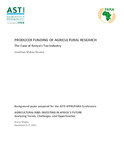| dc.description.abstract | This study provides an assessment of the performance of producer financing in Kenya’s tea industry. It is based on a comprehensive literature review, in combination with analysis of data derived from the Tea Board of Kenya (TBK) and the Tea Research Foundation of Kenya (TRFK). The secondary data analysis is complemented by expert opinions from representative of the Kenya Tea Development Agency (KTDA), the Kenya Tea Growers Association (KTGA), TBK, TRFK, and the Ministry of Agriculture (MOA), particularly the State Corporations Department.
Currently, the tea industry operates under the Tea Act (CAP 343) and Agricultural Act (CAP 318) of the laws of Kenya. While the Tea Act is vested with regulatory services, the Agricultural Act focuses on oversight of the whole production process, as a technical arm. In addition, the Tea Act mandates that TBK undertake tea research through its technical arm, TRFK, per the State Corporations Act (CAP 446), which is also incorporated as a company limited by guarantee under the Companies Act (CAP 486) of the laws of Kenya. TBK is both a producer body that promotes and represents the tea industry, and a parastatal body appointed by government to regulate the industry. TBK is charged with facilitating research into all aspects of tea growing, manufacturing, and pest and disease control.
To finance its (regulatory, promotional, and research), activities and programs the Board levies a manufacturing cess based on processed tea deliveries by all registered tea factories. The cess is statutory, and is currently the main source of revenue for the Board. The Tea Act provides a review by the Minister for Agriculture after consultation with the Board. Currently, the rate of the cess is at KSh. 46 cents per kg of processed tea. Today, the manufactured tea cess revenue collected is shared between TBK and TRFK on a 50/50 basis and used to finance both institutions. In addition, TBK is mandated to collect an Agricultural Produce Cess on green leaf production for the local authorities where tea is produced, disbursing it to the District Tea Road Committees for road infrastructure maintenance.
The major challenges facing TRFK are increasing the adoption of improved technologies to close the gap between research and actual farm yields. The Foundation’s efforts to enhance branding, product diversification and value addition are limited by the following challenges: lack of an adaptive tea research factory and other relevant equipment; qualified and experienced personnel in the fields of food science, biochemistry and process engineering; and inadequate exchange of market information. Inadequate processing capacities in Kenyan factories and lack of operational policies and guidelines for intellectual property rights are still a challenge. | en |

